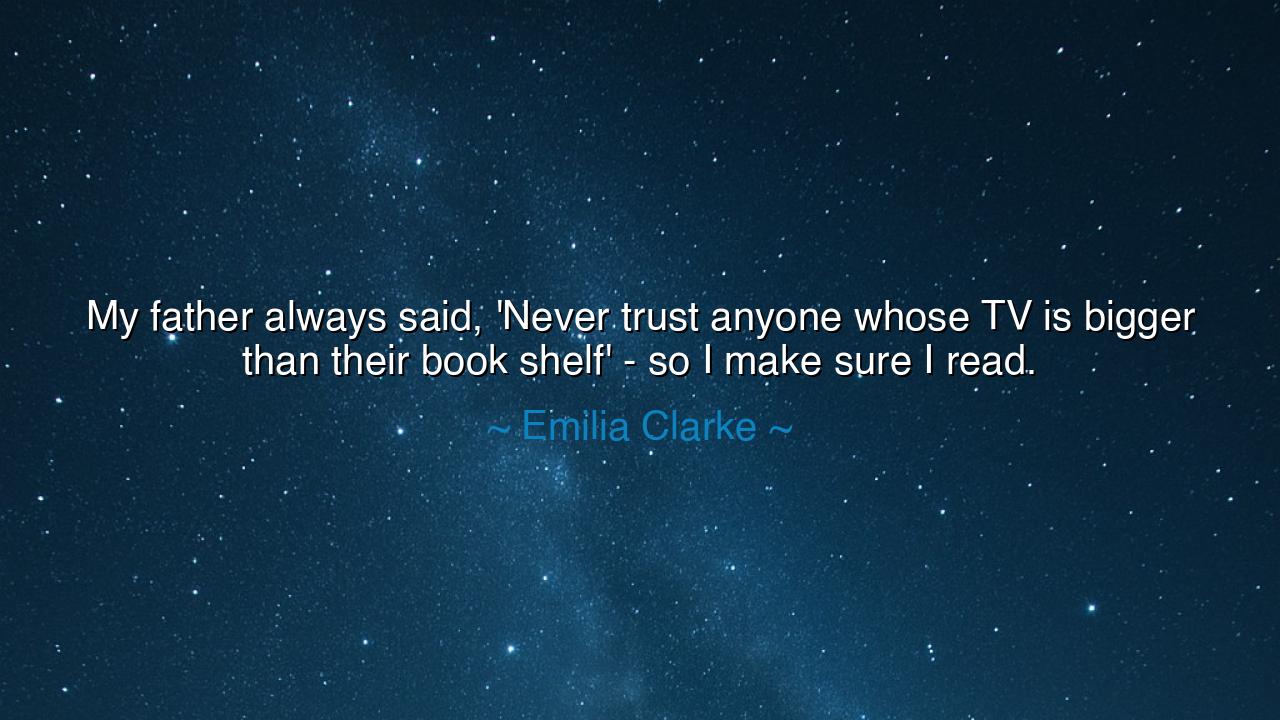
My father always said, 'Never trust anyone whose TV is bigger
My father always said, 'Never trust anyone whose TV is bigger than their book shelf' - so I make sure I read.






Hear the wisdom carried in the words of the actress Emilia Clarke, who recalled the counsel of her father: “My father always said, ‘Never trust anyone whose TV is bigger than their bookshelf’—so I make sure I read.” Though spoken in jest by some, these words carry the depth of an ancient warning: that a life measured more by distraction than by wisdom is a life shallow, that the soul which feasts only on entertainment and never on knowledge cannot be trusted to guide itself or others.
The TV in this saying is more than a screen; it is the symbol of fleeting pleasures, the endless stream of images that dazzle the eye but seldom nourish the spirit. A man who builds his home around such things reveals what he worships: comfort, distraction, escape. But the bookshelf, heavy with the weight of thought and story, stands as a monument to discipline, curiosity, and the pursuit of truth. To prize the bookshelf above the screen is to honor the mind over the fleeting passions of the hour.
History has long borne witness to this divide. Consider the citizens of ancient Rome in its decline. Once, they were a people of philosophers, generals, and builders, devoting themselves to the study of law, governance, and strategy. But in time, their appetite for bread and circuses grew greater than their love for wisdom. Their amphitheaters swelled with spectacles while their libraries fell silent. And so the empire, though vast in riches, crumbled in spirit, for the people had chosen entertainment over enlightenment. The words of Clarke’s father echo this same truth: beware those who fill their lives with distraction but starve their minds of learning.
And yet the bookshelf does not speak only of dry knowledge. It holds within it the dreams, the voices, and the wisdom of generations. To read is to converse with the dead, to walk beside saints and sinners, poets and kings, visionaries and rebels. In books, one finds not only knowledge, but empathy—the power to see the world through another’s eyes. The man who reads is a man who has lived a thousand lives, while the man who only watches lives but one, and that one shallow.
Clarke’s own reflection—“so I make sure I read”—reveals her choice to follow the higher path, to balance the glitter of modern life with the grounding of timeless learning. She shows us that the bookshelf is not merely an ornament, but a covenant: that we owe it to ourselves and to others to cultivate wisdom. For wisdom breeds humility, and humility breeds trust. Without it, men become dangerous, guided not by reason but by impulse.
O children of tomorrow, let this lesson be engraved upon your hearts: judge not by possessions, but by priorities. Do not measure the worth of a man by the shine of his screen, but by the weight of his wisdom. Fill your shelves with books, your mind with questions, your soul with stories. For in the end, it is not the shows you have watched that will guide you in times of trial, but the truths you have learned, the wisdom you have gathered, and the character you have forged.
Thus the father’s words, carried through the daughter’s voice, live as a parable for our age: Never trust the man who exalts amusement above knowledge, distraction above truth. Choose instead to be the one who reads, who learns, who grows. For in the battle between the TV and the bookshelf, it is always the bookshelf that builds the soul.






LTLan Tran
Emilia Clarke’s quote made me smile—it’s a great mix of humor and wisdom. I think there’s definitely value in spending time reading and expanding our minds. But it also made me wonder if we’re being too hard on people who don’t prioritize reading. Are there other ways to engage the mind besides reading? Can activities like travel, conversation, or even gaming foster intellectual growth in a similar way?
AKHuynh Anh Khoa
I love how Emilia Clarke’s father’s advice emphasizes the value of books and learning. It suggests that intellectual development should come before entertainment, which I agree with. But in today’s world, where TV and streaming are more accessible than ever, how do we foster a love of reading in younger generations? Is there a way to encourage them to make reading as important as their screen time?
MDMy Diem
Emilia Clarke’s dad sounds like he had a pretty solid perspective on how to live a well-rounded life. There’s definitely something to be said about the importance of reading, especially in a world so full of distractions. I wonder, though, does this mean that people who enjoy TV or movies are missing out on something? Can’t we gain knowledge or understanding in other ways? It’s an interesting way to think about how we use our time.
TLTrangg Lynn
I really like the sentiment in Emilia Clarke’s quote. It’s a playful jab at how easy it is to prioritize entertainment over education or personal growth. But what about those who find inspiration in movies, TV shows, or other forms of media? Can these be as enriching as books? This quote makes me think about how we balance both, because while books offer knowledge, other forms of media can shape our worldview in different ways.
TMNguyen Ngoc Thanh Mai
Emilia Clarke’s quote about her father’s advice is so relatable. It’s a clever way of highlighting the importance of reading and staying intellectually engaged. I think it’s a little funny but also true—there’s a difference between indulging in mindless entertainment and feeding your mind with knowledge. But how many people today can really say they read more than they watch TV? I wonder if we can find a balance between the two.